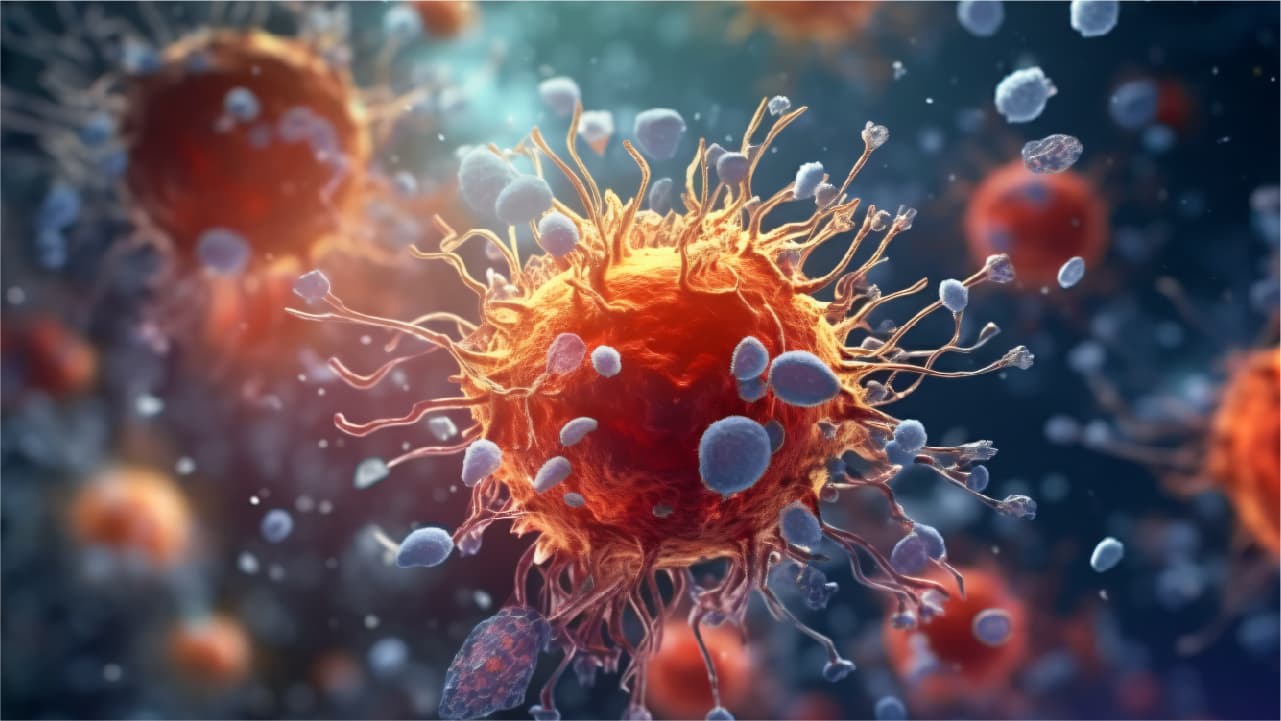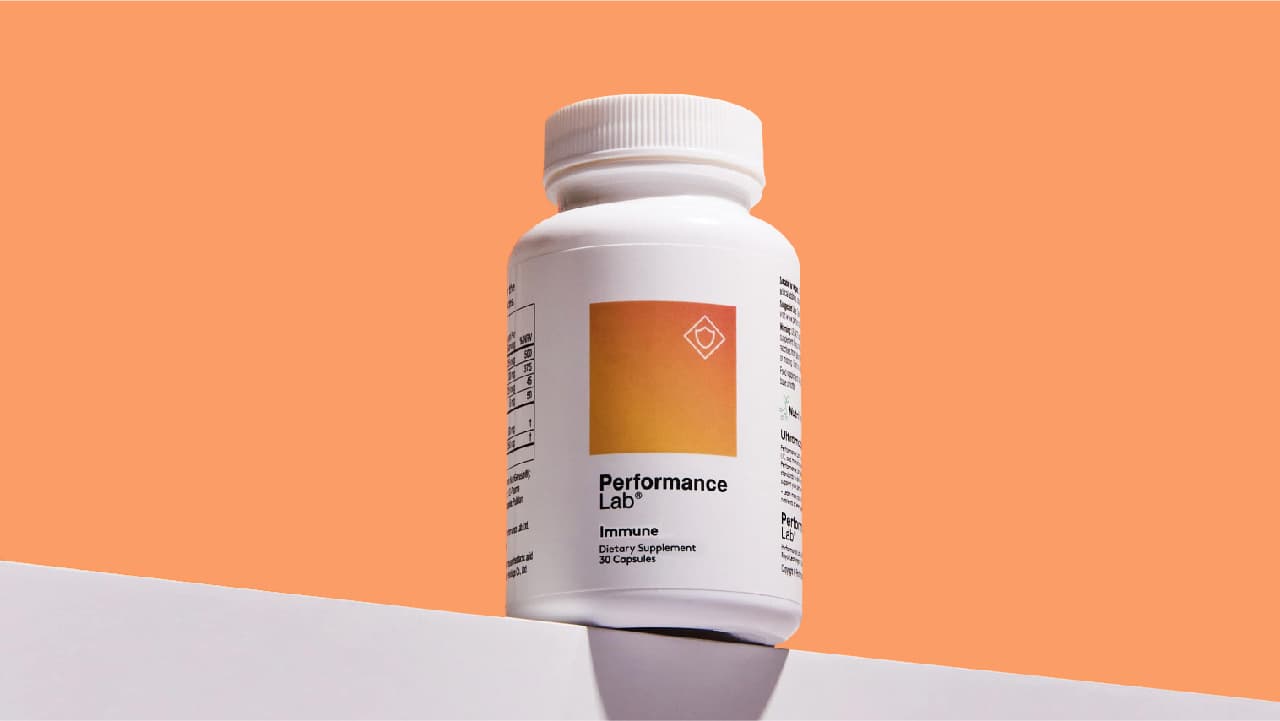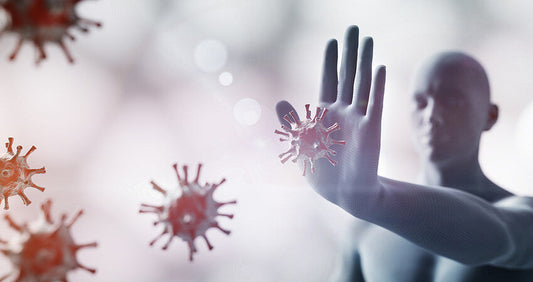The story you are about to hear is true. The names have been changed to protect the innocent.
I once tried to sled down my grandparents' stairs in a plastic tub.
I crash-landed into the table at the bottom and took out a fancy looking vase.
That fancy looking vase was an urn. And that urn contained the ashes of Tina. Tina was the much-loved and very much missed, family dog.
My name is Bert and I very nearly ruined Christmas.
No, this isn't a scene from National Lampoon's Christmas Vacation.
But on a scale of 1 to Griswold, I was up there.
Who knew that the most wonderful time of the year could be so perilous. From low impact papercuts and stepping on lego, to ladder falls and squirrels living in your freshly decorated tree.
The holidays can be hazardous.
And whilst we're all trying our best to navigate this festive obstacle course, the other thing we need to swerve, is getting ill.
Why do we get ill during the holidays?

Do you ever feel like the moment you stop and look forward to some R&R, you're immediately struck down with the lurgy?
There are a few theories about this. Especially when it come to The Holidays.
The deeper we get into the holidays, the more it feels like a group of 7 year olds are running the show. We eat what we want, when we want, and bedtime is anyone's guess. Sometimes we don't even know for sure what day it is.
The holidays go a bit Lord of the Flies.
Meanwhile, closely observing this beautiful chaos, and rubbing their grubby little hands together, are the germs. For them, this breakdown of order and civilization provides the perfect ecosystem in which to thrive...
Socializing indoors

Party season is on. And those indoor social events increase our susceptibility to illness. We're all a lot closer than we'd normally be. We're leaning in to speak and hear one another, and those germs are poised and ready to mingle.
The limited air circulation makes it easier for respiratory droplets from coughs, sneezes and talking, to carry viruses and spread bacteria. Which is great news for airborne illnesses like colds and flu.
Additionally, we're all sharing the same surfaces. Doorknobs, utensils, Keith from accounts' festive comedy glasses - they all carry germs that can be transferred through touch.
Stress

Getting everything finished at work and at home in time for the holidays is no mean feat. It takes planning, stamina and ruthless decision making. Which can be stressful. And stress can impact immunity and lower the body's defenses.
In extreme or sustained stressful situations, our bodies trigger the release of cortisol and other stress hormones. These can suppress the effectiveness of the immune system by reducing the production of white blood cells and disrupting their ability to respond to pathogens. Which can leave the body more vulnerable to infections like colds, flu, and other illnesses.
But it's not just the big stuff that can influence our physical health. A phenomenon known as the 'four-day desirability dip' suggests even smaller stressors have an impact. (1)
65 volunteers recorded daily desirable and undesirable events, along with their physical health. A 'desirable event' is classed as something that would normally boost your mood. The data showed that desirable events were less frequent in the four days leading up to getting ill. Which supports psycho immunological theories that smaller stressful events can influence physical health, and perhaps make us ill.
Feeling stressed can also lead to disrupted sleep and unhealthy eating. Which can also impact your immune system.
Change in diet

At the start of the holidays, we implement a 'damage limitation' policy for diet.
This isn't our first rodeo.
With the relentless parade of tempting foods, we know that telling ourselves to be good throughout is futile. But as another tin of chocolates starts doing the rounds, we've got some tough decisions to make.
Because it's undeniable: a change in diet can make us more susceptible to illness.
Highly processed foods and simple sugars can disrupt the balance of gut microbiota, an essential component of the immune system. They can also trigger inflammation, which, when chronic, can weaken our immune response.
Eating too many of these foods typically results in less intake of nutrient-rich foods. Which deprives our body of the vital vitamins and minerals necessary for maintaining a strong immune system.
Disrupted sleep

Due to all of the above, our circadian rhythm is in tatters.
When we don't get enough sleep, the body produces fewer cytokines, a type of protein that targets infection and inflammation, effectively creating an immune response.
Sleep deprivation can also reduce the production of other important immune cells, like antibodies and T-cells. Which can make our body more vulnerable to infections.
Low vitamin D

Winter can make us feel like hibernating. And as such, we don't tend to get ourselves outdoors enough. Which means our vitamin D levels are typically lower around this time of year.
Vitamin D is synthesized in the skin through exposure to sunlight. During shorter and darker winter days when we wear more clothes and get less opportunity to get out in the sun, our vitamin D levels are depleted.
Vitamin D is known to enhance the pathogen-fighting effects of monocytes and macrophages - the white blood cells that are important parts of your immune defense. It also decreases inflammation. (2)
The key to staying healthy through the holidays is bolstering our immune system.
How to protect our immune system

Our immune system is a complex network of cells and proteins. And because of its complexities, there are many ways we can support it:
Eat a Balanced Diet
We need the right amount of nutrients and energy for our immune system to function properly. Whilst there's no individual food or nutrient that can promise immunity, studies show there are some key micronutrients that affect immunity. (3)
Vitamins C, D, E, zinc, and selenium are key for the growth and function of immune cells. These nutrients are found in citrus fruits, vegetables, whole grains, lean proteins, and healthy fats.
Regular Exercise

Engaging in regular moderate exercise contributes to your immune system in several ways:
Improved circulation: Exercise enhances blood flow, allowing immune cells and substances to move through the body more efficiently, improving surveillance and response to potential threats. (3)
Reduction in Stress Hormones: Physical activity can lower stress hormones like cortisol and adrenaline, which in high levels can weaken the immune system. (4)
Physical Barrier Protection: Regular exercise can strengthen the respiratory system, helping to protect against airborne infections.
Immune Cell Regeneration: Some research suggests that regular, moderate exercise can promote the regeneration of immune cells, particularly T-cells. (5)
Anti-Inflammatory Effect: Exercise can induce an anti-inflammatory response, which is beneficial for immune function and overall health.
Adequate Sleep

Getting an adequate amount of high-quality sleep is key to supporting our immune system. (6)
In one study, 153 participants were infected with rhinovirus and monitored for symptoms of a cold. Those sleeping less than 7 hours were nearly three times more likely to develop a cold than those getting 8 or more hours of sleep. (7)
Catching the right Zzzzs can help boost immunity through:
Cytokine Production: Sleep has been shown to influence the production of cytokines, which are proteins that play a critical role in the immune system, particularly in fighting infections and inflammation. During sleep, the body can increase the production of certain cytokines that are essential for an effective immune response. A lack of sleep, on the other hand, may decrease the production of these protective cytokines.
T-Cell Function: T-cells are a type of white blood cell that are essential for the body's immune response, especially against viral infections. Studies have indicated that good quality sleep can enhance the effectiveness of T-cells. Sleep can improve the ability of T-cells to adhere to, and destroy cells infected with viruses.
Stress Hormone Reduction: High-quality sleep has been linked to a reduction in stress hormones, like cortisol. Elevated levels of cortisol over a prolonged period can suppress immune system function. By reducing stress hormones, sleep can prevent this immune suppression and promote a healthier immune response.
Immune Memory: Sleep plays a crucial role in the formation of immune memory. This is the process by which the immune system remembers how to respond to a previously encountered pathogen. Adequate sleep can enhance the body's ability to remember and respond more effectively to these pathogens if they are encountered again.
Hydration

Drinking enough water sounds obvious, but adequate hydration plays a vital role for immune health:
Transport of Nutrients and Removal of Toxins: Water facilitates the transport of nutrients to cells and the removal of toxins and waste products, which is crucial for optimal functioning of the immune system.
Lymph Production: Water is a key component of lymph, a fluid that circulates throughout the lymphatic system, carrying immune cells to areas of the body where they are needed.
Mucosal Membranes: Staying hydrated helps to keep mucosal membranes moist, which are critical in trapping and removing pathogens like bacteria and viruses.
Say yes to that extra glass of water.
Proper hydration supports the immune system by ensuring efficient transport of immune cells and materials, aiding in detoxification, and maintaining the protective barriers against infections.
Avoid Smoking and Limit Alcohol Consumption

Avoiding smoking and limiting alcohol can significantly boost immune health:
Smoking Impact: Smoking damages the immune system by impairing the function and balance of immune cells, like T cells, B cells, and macrophages. It also harms the respiratory system, making it more susceptible to infections. (8)
Alcohol Effects: Excessive alcohol consumption can weaken the immune system by reducing the number of immune cells, impairing the function of macrophages and T cells, and disrupting the production of cytokines, which are crucial for immune responses. (9)
By avoiding these harmful habits, the body can maintain a more robust and effective immune system, better equipped to fight off infections and diseases.
Boosting your immune cells

The immune system is a complex network of cells and proteins that defends the body against infection. Each of these plays a unique and crucial role in maintaining the body's defense against a wide range of health threats.
They're an elite taskforce with some serious 'don't-mess-with-me' names:
Natural Killer Cells: These cells provide a fast, non-specific defense. They can target and destroy a wide range of invading pathogens and infected cells without prior exposure.
Killer T-Cells: Specialized in seeking and destroying specific invaders. They identify and eliminate cells infected by viruses or that are otherwise damaged.
Helper T-Cells: These cells play a crucial coordinating role. They help direct other immune cells, including B-cells and T-cells, to produce antibodies and engage in the fight against invaders.
Plasmacytoid Dendritic Cells: Act as the 'commanders' of the immune system. They recognize pathogens and alert other immune cells, initiating an immune response.
B-Cells: Responsible for producing antibodies. These antibodies target, bind to, and neutralize specific antigens (foreign substances) introduced by pathogens.
Adding a supplement that activates and enhances these 5 immune cell types, can reinforce your natural resistance to seasonal colds and flu.
Performance Lab® Immune is formulated to address and support every aspect of your immune system.

Immune features the unique probiotic LC-Plasma (IMMUSE™), shown to activate and enhance 5 types of immune cells. And backed by 7 human clinical trials for safety and efficacy.
It also blends the most powerful immune-boosters - vitamin D3, vitamin C, selenium, zinc, probiotics, and glutathione to offer support and help plug any nutritional gaps.
Final thoughts
The holidays are there for celebrating. And nobody should shame you for that. It's not about perfection, but more about balance.
Embrace the festive treats and family traditions but do so with a mindset of moderation and mindfulness. Try eating differently around the holiday, but eat what you'd like on the day itself.
Fill your plate with nutrient-rich foods, listen to your body's cues, drink more water, and consider incorporating a quality supplement to bridge any nutritional gaps.
You can have your (Christmas) cake and eat it too.
References
- https://pubmed.ncbi.nlm.nih.gov/3236277/
- https://www.sciencedirect.com/science/article/pii/S0955286322001735
- https://news.harvard.edu/gazette/story/2023/11/new-study-explains-how-exercise-reduces-chronic-inflammation/
- https://pubmed.ncbi.nlm.nih.gov/24599630/
- https://pubmed.ncbi.nlm.nih.gov/32342473/
- https://aacnjournals.org/ccnonline/article/32/2/e19/20424/Sleep-and-Immune-Function
- https://www.ncbi.nlm.nih.gov/pmc/articles/PMC2629403/
- https://pubmed.ncbi.nlm.nih.gov/27902485
- https://pubmed.ncbi.nlm.nih.gov/15706761/














